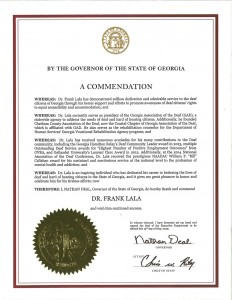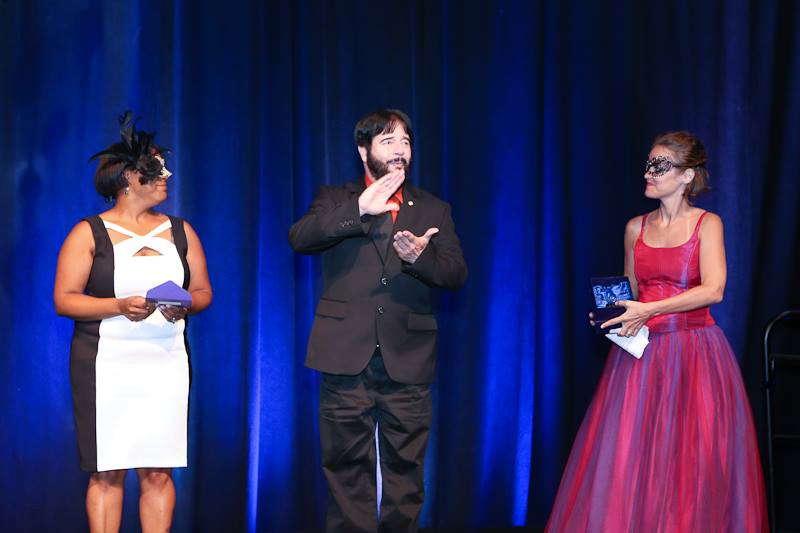Frank Lala: a Dynamic Leader for the Deaf and Hard-of-Hearing Community
It’s clear that Frank Lala ’78 (Community Health Education) has affection for quoting important thinkers and doers.
In two emails, he cited Helen Keller, Friedrich Nietzsche, Booker T. Washington, Robert Frost and William Penn. Lala also offered this one from an unknown author:
“If you think you’re too small to make a difference, you have obviously never spent the night in a tent with one mosquito.”
People often use quotes to inspire. For Lala, it’s fitting. He has been an inspirational force for the Deaf and hard-of-hearing community, particularly those who battle substance abuse, for the past four decades.
Lala is a vocational rehabilitation counselor for the Department of Human Services in Georgia. Lala recently was honored at the Registry of Interpreters for the Deaf, Inc. national conference with the Marie J. Philip Award. The award goes to a deaf individual who has shown significant dedication to and involvement in the field of interpreting on local, regional and national levels. The award is named after the late pioneering American Sign Language teacher and researcher who is regarded as one of the country’s most important sign language and Deaf culture advocates.
Lala began to lose his hearing at age 5 after a toxic reaction to tonsillitis medication. He has dedicated his life’s work to bettering the lives of people who share the same challenges he has. But he is also passionate about ridding the Deaf community of alcoholism and substance abuse.
“Early on in my star-crossed life, I had lost most of my immediate family to drug abuse,” Lala said. “As a consequence, by the time of my graduation from high school, I stood alone and uncertain at the threshold of a very frightening future. I suffered and sustained the anguish of what substance abuse did to my life, family and friends. I swore that as long as I lived, I would not drink any alcohol, use drugs or smoke.
“Somehow in this terrifying and grim existence, I wanted to help others with their substance abuse,” he continued. “Maybe once I graduated from school, I would pursue this dream I had promised myself. Too young then to realize it, the negative life I led as a young boy became my positive strength as a young adult. Much later, I read philosopher Nietzsche, who said something to this effect: ‘When you experience suffering, you have two choices: Either you are going to surrender, accept defeat and perish in the process — or you will overcome it and become a stronger person for it and survive.’”
Lala’s drive began early. He attended the California School for the Deaf in Riverside and then Riverside City College, where the coordinator of the deaf program suggested he attend CSUN.
He enrolled at CSUN in 1971 and said that during his time here he met many individuals who helped elevate and motivate him.
“They provided, directly or indirectly, mentorship that made me who I am today: Thomas Mayes, Ray L. Jones, Barbara Boyd, Joyce Groode, June Newkirk; [Registry of Interpreters for the Deaf (RID)] interpreters Virginia Hughes, Faye Wilkie, Lou Fant, Frank Paul, Barbie Brandt, Debbie Barber and Sharon Neumann Solow; several professors — especially in my major, health sciences — and many more RID-certified interpreters,” Lala said. “They all conveyed their conviction and belief in my potential. They instilled incalculable courage and self-esteem in me during my years at CSUN.”
After CSUN, Lala earned a certificate in performing arts from UCLA, a master’s in education from Western Maryland College and a Ph.D. in health and human services.
In the years since school, Lala has dedicated his talents in different ways to help the Deaf and hard-of-hearing. He was a co-founder of a recovery program for Deaf and hard-of-hearing alcohol and drug abusers in Southern California. He has written articles, contributed to journals and wrote the book Counseling the Deaf Substance Abuser. He has lectured and been a go-to speaker on the topic at numerous conferences. Lala also founded the American Martial Arts Association of the Deaf. He holds black belts in karate and jujitsu.
Lala founded the Chatham County Association of the Deaf in Georgia. He has promoted the provision of interpreters and the use of video relay services in hospitals and healthcare centers, and he has educated the public via speaking engagements, presentations and media about the needs and rights of individuals who are deaf or hard of hearing. He is also the president of the Georgia Association of the Deaf (GAD).
Lala has been recognized for his work by the California School for the Deaf Riverside Alumni Association, Western Maryland College, Gallaudet University, the Georgia Association of the Deaf, Chatham County Association of the Deaf and has received commendations from Georgia Gov. Nathan Deal and Savannah Mayor Edna Branch Jackson.
 “His greatest strength is as a leader,” said Becky Sills, who was the director of the Georgia Vocational Rehabilitation Deafness Program until her retirement in December. “He identifies needs and works on a plan to try to meet that need, whether it’s with his clients or in the community.
“His greatest strength is as a leader,” said Becky Sills, who was the director of the Georgia Vocational Rehabilitation Deafness Program until her retirement in December. “He identifies needs and works on a plan to try to meet that need, whether it’s with his clients or in the community.
“I was able to contact him and bring him out here (from California in 2008),” she said. “He immediately started working in the community to organize the deaf people to establish a local association for the deaf and to improve situations in his area. He did education for hospitals and civic groups on how to work with deaf people, in addition to his new job as a vocational rehabilitation counselor.”
The Marie J. Philip Award recognized Lala for the breadth of his work. He participated in panels to educate landlords, realtors and property management companies about their responsibility to provide access to the Deaf community through interpreting services and video interpreting services. He also partnered GAD with the Georgia Registry Interpreters for the Deaf (GaRID) to work collaboratively to enhance the lives of the Deaf and hard-of-hearing community in the state.
In June, Lala and GaRID President Erin Salmon signed a memorandum of understanding in front of National Association of the Deaf President Chris Wagner and Jared Patton, the coordinator of deaf services for the state of Georgia, solidifying the unity between the two groups.
GAD and GaRID are dedicated to developing a collaborative platform in which both organizations can develop and share ideas on how to benefit each other.
“This is the first time GAD and GaRID have gone into a collaboration to better both of our organizations,” Salmon said. “The two organizations need each other, and this collaboration will strengthen our work together.”
Lala’s passion for leading his community is never-ending. He said he hopes universities will one day offer certification programs for Deaf students in the areas of alcohol and drug rehabilitation. There is a need and demand for more insightful and caring bilingual and bicultural counselors, intake personnel, therapists and other professionals, he said.
“We need public support, both monetarily and in less tangible areas such as morale,” Lala said. “Overall commitment on the part of everyone involved in the therapeutic process is greatly needed on both giving and receiving ends, to enable people to bring their best to the process of eliminating from the Deaf community the impediment of alcoholism and substance abuse. The scourge of addiction or the underlying propensity to abuse substances is a disability. This can ultimately be overcome so that all deaf people shall have a greater probability of living well-adjusted lives.”
The man who often quotes others came up with what he calls “A Credo for Deaf Americans,” which offers quotable lines throughout and summarizes the desire for the community to be heard — loudly:
We don’t choose to be the common linguistic minority.
It is our right to be the uncommon and noble linguistic minority.
If we can, we seek opportunity, not security.
We don’t wish to be “kept” citizens, humbled, dulled by having the state look after us.
We want to take the calculated risk to dream and to build, to fail and to succeed.
We want to abolish stereotyping and to remove the prevalent public mentality toward prejudice.
We will not tolerate biased perceptions, criticisms or censures of our beloved American Sign Language.
We will not accept abuse of our Deaf identity by oppressors, nor our rights to self-determination.
We refuse to barter incentive for a dole.
We prefer the challenge of life to a guaranteed existence; the thrill of fulfillment to the stale calm of Utopia.
We will not trade freedom for beneficence, nor our dignity for a handout.
We will never cower before any master, audism or paternalistic attitudes, nor bend to any threat of discrimination.
It is the heritage of our Deaf Culture to stand erect, proud and unafraid; to think and act for ourselves; to enjoy the benefits of our creations and to face the hearing world boldly and say, “This we have achieved.”
All of this is what it means to be Deaf Americans.


 experience
experience